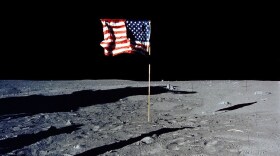Adam Frank
Adam Frank was a contributor to the NPR blog 13.7: Cosmos & Culture. A professor at the University of Rochester, Frank is a theoretical/computational astrophysicist and currently heads a research group developing supercomputer code to study the formation and death of stars. Frank's research has also explored the evolution of newly born planets and the structure of clouds in the interstellar medium. Recently, he has begun work in the fields of astrobiology and network theory/data science. Frank also holds a joint appointment at the Laboratory for Laser Energetics, a Department of Energy fusion lab.
Frank is the author of two books: The Constant Fire, Beyond the Science vs. Religion Debate (University of California Press, 2010), which was one of SEED magazine's "Best Picks of The Year," and About Time, Cosmology and Culture at the Twilight of the Big Bang (Free Press, 2011). He has contributed to The New York Times and magazines such as Discover, Scientific American and Tricycle.
Frank's work has also appeared in The Best American Science and Nature Writing 2009. In 1999 he was awarded an American Astronomical Society prize for his science writing.
-
Physicist Carlo Rovelli is unique among modern scientists who write for popular audiences in his ability to capture the purest essence of his science with both precision and lyricism.
-
These works make apparent how singular an achievement America's moon landing was — and show that half a century later we're still grappling to understand its long-term meaning.
-
Does mess drive you nuts? Astrophysicist Adam Frank says to think of it as showing off — all proteins need mess to do their own work.
-
David Wallace-Wells' The Uninhabitable Earth and Nathaniel Rich's Losing Earth offer valuable perspectives on climate change — if we're committed to being adult enough to face the future.
-
Grad students are the engines of America's scientific and technological prowess — with an amazing return on investment, says professor Adam Frank.
-
By standing strong against the Nazis, America became a beacon of hope to some of the world's greatest scientists — whose positive effects on American science we still feel today, says Adam Frank.
-
We live in a world of endless pressing concerns with so many competing avenues of being productive. A good game makes no demands. All that matters is the enjoyment of the doing, says Adam Frank.
-
Inside every plant there is an insanely complex molecular engine that turns sunlight into food — and across billions of years, photosynthesis shaped the history of the entire planet, says Adam Frank.
-
On Saturday, people from around the country will take to the streets in the March for Science. Organizers say that the point of the March is not to make science political, but to highlight the reality of science to politicians, as a guide in policymaking, in which science is an uncharted issue.
-
The stand taken by a group of elder Republican statesmen and the formation of the Climate Solutions Caucus represent a ray of hope as the clock ticks on Earth's shifting systems, says Adam Frank.







